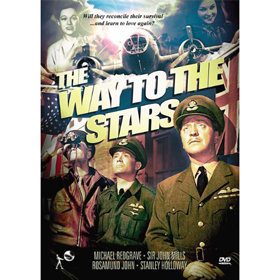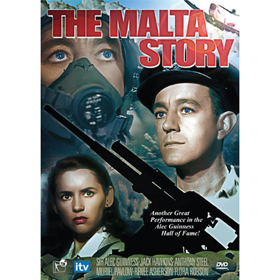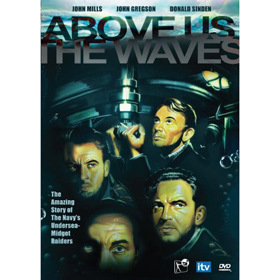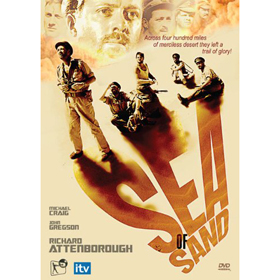
 |
|
|
|
Tired of seeing the same 20 war films touted each Father's Day, and repeated ad infinitum on TV's cable channels? VCI Entertainment has reached into the as yet largely untapped reservoir of British war films released by Rank, and come up with four fresh specimens that have not seen much if any distribution on American TV, even though they feature stars like Alec Guinness and Richard Attenborough. Three of the titles dusted off for VCI's four separate releases are prime examples of the '50s "How I Won the War" phenomenon. During those economically depressed years English screens lit up with celebrations of the daring and gallantry of wartime combatants of ten years before. The tone of these pictures was "they fought and sacrificed for us", an attitude that persisted until revisionist and somewhat cynical big-scale war movies took over. The Bridge on the River Kwai questioned all notions of patriotism and valor, while the new escapist approach seen in The Guns of Navarone invented make-believe secret missions packed with exciting war-themed combat and destruction. 
The first film in the grouping was completed just as the war was ending, and thus approaches its subject with a special immediacy and respect. VCI's The Way to the Stars is the full 109-minute English version, and not the 87-minute American cut-down called Johnny in the Clouds. The movie tells the story of the British aerodrome Halfpenny Field from the Battle of Britain until victory. We see several "generations" of English and American flyers pass through. Many are lost on missions over Germany. When the field is handed over to the USAAF, the RAF officers still present are surprised by the brash, manners-challenged Yankee fliers, who eat peanut butter, wear flying gear into the Officer's Mess and serve tea in unheated teapots. A serious drama, the movie eliminates a big star actor in almost the first scene, as if serving notice that nobody will survive on the basis of credit billing. There's plenty of opportunity to ponder Brit argot of 1940. "I bloody nearly pranged the kite," says dashing Spitfire pilot Johnny Archdale (Michael Redgrave), who drives a sporty MG and marries the beautiful manageress of the local hotel, Miss Toddy (Rosamund John). The other major romance is between Pilot Officer Peter Penrose (John Mills) and the young Iris (Renée Asherson). Peter begins as an underachieving flier and Iris is stuck with a miserable chaperone, and he breaks off the relationship in the belief that it's not right to marry and perhaps have a child when one might die at any time. These subplots are touching but not overstated; Terence Rattigan's screenplay treats the film's tragedies with respect. One bittersweet thread follows a married American, Johnny Hollis (Douglass Montgomery of the first Waterloo Bridge). He grows fond of a war widow and feesl the beginnings of romantic involvement. The scenes on the airfield are quite good, as there were still plenty of aircraft available for filming -- Spitfires, B-17s, etc.. Compatibility issues between the Brits and the Yanks provide quite a bit of fun, with the reserved Basil Radford commenting on the rudeness of some of the American fliers. This is the first movie for Bonar Colleano, a U.S.-born circus performer who played mouthy Americans in several U.K. pictures. Other Americans are impersonated by Brits that almost get the accents right. All of these movies are good for spotting name actors. Stanley Holloway is a civilian incensed that the visitors are drinking all the good liquor. Trevor Howard is an RAF group captain. Look fast and you'll see David Tomlinson, Vida Hope, Anthony Dawson and Felix Aylmer. Also showing up just to sing a song is a teenage Jean Simmons, barely 15 years old. The Way to the Stars is a worthy alternative to our own Twelve O'Clock High. Anthony Asquith's direction is excellent; unlike later movies about flyers, he refrains from telegraphing who will live and who will die with cutaways to dogs, fond farewells, etc. One doomed pilot forgets his lucky charm, but we learn about it only after the fatal mission. 
The chronology jumps eight years forward to the unashamed patriotism of Malta Story, the saga of a valiant defense that we are told turned the tide of the North African campaign. Four years before The Bridge on the River Kwai, Alec Guinness plays a mild-mannered aerial reconnaissance pilot serving under Jack Hawkins' tough brigade commander. With a little help from the stubborn Royal Air Force and Navy, these two hang on to the island of Malta even as the Germans destroy convoy after convoy of re-supply ships. The straight narrative of the siege and its ups and downs of battle are awkwardly balanced with a pair of love stories. The very un-romantic Guinness courts Maltese beauty Maria (Muriel Pavlow), and they generate very little heat between them. Rugged Wing Commander Bartlett (Anthony Steel) is enamored of WAF Joan Rivers (Renée Asherson) in the little time they have together. Both women work as aircraft plotters in the command room. Flora Robson suffers loudly as Maria's proud mother, trying to save her family from starvation under the constant German bombardment. The movie features quite a few actors from the group that seemed to get all the roles available in 1950s British films, a closed club that must have been tough to break into. Nigel Stock is a surprise playing a Maltese spy, and various Brit servicemen are played by Peter Bull, Michael Craig, Maurice Denham, Gordon Jackson, Geoffrey Keen, Sam Kydd, Victor Maddern, Lee Patterson and Noel Willman. With few authentic planes and ships available Malta Story makes use of special effects for most battle scenes. These range from so-so to rather good. Wires are frequently visible holding up the planes, but some model shots are clever illusions done with painted backdrops. Matte ace Albert Whitlock provides scores of paintings, some of which are so good that they almost fool the eye. The effects shots are intercut with excellent military film of the actual bombing of the city of Valetta by Stuka planes, which dive straight down at their targets. The most earnest and rigid of the four pictures, Malta Story has plenty of posed shots of the noble defenders showing proud, defiant profiles. Director Brian Desmond Hurst (A Christmas Carol, 1951) directs efficiently enough, but the task of honoring the Malta campaign dampens the movie's emotional impact ... the film seems more intent on not offending Britain's Maltese allies. 
Directed by the prolific Ralph Thomas, 1955's Above Us the Waves seeks to commemorate yet another daring raid by English commandos, the stealth campaign to sink the German pocket battleship Tirpitz in a Norway in 1942 and 1943. The exciting naval combat story is more or less authentic, even if it gives the false impression that the mission was a complete success. It was produced by William MacQuitty, who would move on to the superb A Night to Remember. Commander Fraser (John Mills) convinces Admiral Ryder (James Robertson Justice) that mini-submarines might succeed in planting mines on the formidable German battleship, which rests at anchor sixty miles inside a Norwegian fijord. He enlists three volunteer crews headed by Lieutenants Corbett and Duffy (Donald Sinden & John Gregson). An initial attempt in 1942 uses two Human Torpedo subs, essentially torpedo-shaped chariots ridden by two frogmen. The subs are attached to the bottom of a fishing boat. It avoids capture by a German patrol boat, an episode seemingly revisited for the later The Guns of Navarone. A storm causes both subs to break free and sink, ruining the mission; the sailors must sneak ashore and walk all the way to Sweden. The second attempt uses larger 4-man X-craft midget submarines, which cruise the full 60 miles to the target, cutting through anti- sub and torpedo nets as they go. The daring raid encounters a series of calamities. A mine catches in a tow cable, a periscope is knocked out and one of the boats is spotted early on. Two of the subs develop serious technical problems as they try to lay large "side cargo" explosives under the Tirpitz. It's all quite suspenseful, especially when a sub is trapped under the battleship along with its ticking bombs. The film's only failing is that it can't convey how incredibly COLD a Norwegian fijord must be. This picture has no women at all, although one raider foolishly mentions his wife and kids back home -- talk about signing one's own death warrant. Residual anti-German sentiment is heard when the raider sees that everything on the pre-dawn target is calm: "They're all still dreaming of their fat fräuleins back home." Luckily for the few survivors of the raid, the German Navy operates by a chivalric code -- the captain of the Tirpitz praises his captured enemies as brave men. Above Us the Waves uses plenty of authentic-looking hardware and okay models for some of its battleship scenes. As the mini subs aren't exactly visually imposing, the movie does well in keeping its daring adventure from looking like a few men playing with toys in a bathtub. The exciting film ends on a somber note without telling us that simultaneous raids were carried out against the German ships Scharnhorst and Lützow. The movie also doesn't mention that the heavily damaged Tirpitz survived to fight another year before being sunk by the RAF. 
The final title in VCI's war collection is 1958's Sea of Sand, a very good behind-the-lines "lost patrol" saga in North Africa about desperate attempts to blow up Rommel's fuel supplies, "hundreds of miles behind enemy lines." Cut down by almost twenty minutes, the film was released in the U.S. three years later as Desert Patrol. The accomplished British director Guy Green makes what could have been a repetitive slog through the desert into an exciting, credible adventure. John Gregson returns as Captain Bill Williams, a regular army officer assigned to help defuse new German land mines for the Long Range Desert Group led by the tough Captain Cotton (Michael Craig). The two officers debate the need for strict military rules as the loose-disciplined squad crosses the Libyan desert and encounters the usual problems of air attack, vehicle breakdowns, sandstorms and fuel shortages. Top billed Richard Attenborough plays Brody, the unofficial leader of what is essentially a pack of pirates. Brody has several canteens filled with brandy, a trick that even the bearded, unkempt Captain Cotton won't tolerate. Michael Craig tells it straight in a line most likely cut from the American version: "There's a lot to be said for giving someone big and powerful a kick up the ass!" Sea of Sand would seem to be the template for the terrific, wholly cynical Michael Caine war adventure Play Dirty. The raiders lose vehicles and personnel as they go, and the attack on the fuel dump is only the beginning of a miserable retreat. They get bombed, shot up and ambushed. At one juncture they're saved when Brody spits a mouthful of brandy into a German soldier's face. The 'rum crew' includes Percy Herbert, a young Barry Foster (Hitchcock's Frenzy), Andrew Faulds and Vincent Ball. Faulds and Ball worked for producers Robert S. Baker and Monty Berman on familiar genre pictures like Blood of the Vampire and The Trollenberg Terror. The three leads are very good; the only detriment to the story is what seems an unnecessary last-minute noble sacrifice. And once again, with only a few exceptions, the soldiers that mention having families back home might as well start writing their wills. One unlucky guy is said to have four kids, which in these pictures is a sure kiss of death. VCI Entertainment's separate DVD releases of four VCI War Films are very good if not exceptional encodings of these B&W shows. All are at their original uncut lengths and correct flat ratio except for Sea of Sand, which begins properly matted to 1:66 but then zooms in as soon as the titles have finished. This is not VCI's doing but was part of the video master supplied by the rights holders. The discs have no extras. None of the discs carry a subtitle option, contrary to earlier supplier reports and web sales listings. VCI's packaging designs vary in quality but they could use better copy... I'm not sure that the unclear tag line "Will they reconcile their survival ... and learn to love again?" really applies to the movie. Keeping English heraldry straight is not easy work, but John Mills is credited as Sir John Mills, right next to Sir Michael Redgrave, who is written up as just plain Michael. Neither needed to be so named, as they won their honors decades after the release of The Way to the Stars. And VCI has added a "The" to Malta Story, an error I barely caught myself. Knowing that many Savant readers will not have heard of any of these pictures, I'd have to say that The Way to the Stars is the one that transcends its genre. Above Us the Waves and Sea of Sand are very good war dramas. Malta Story is not bad but it tends to play the patriotism card a little strongly, and it is not a strong showing for Alec Guinness.
On a scale of Excellent, Good, Fair, and Poor,
Reviews on the Savant main site have additional credits information and are often updated and annotated with reader input and graphics. Also, don't forget the 2010 Savant Wish List. T'was Ever Thus.
Review Staff | About DVD Talk | Newsletter Subscribe | Join DVD Talk Forum |
| ||||||||||||||||||